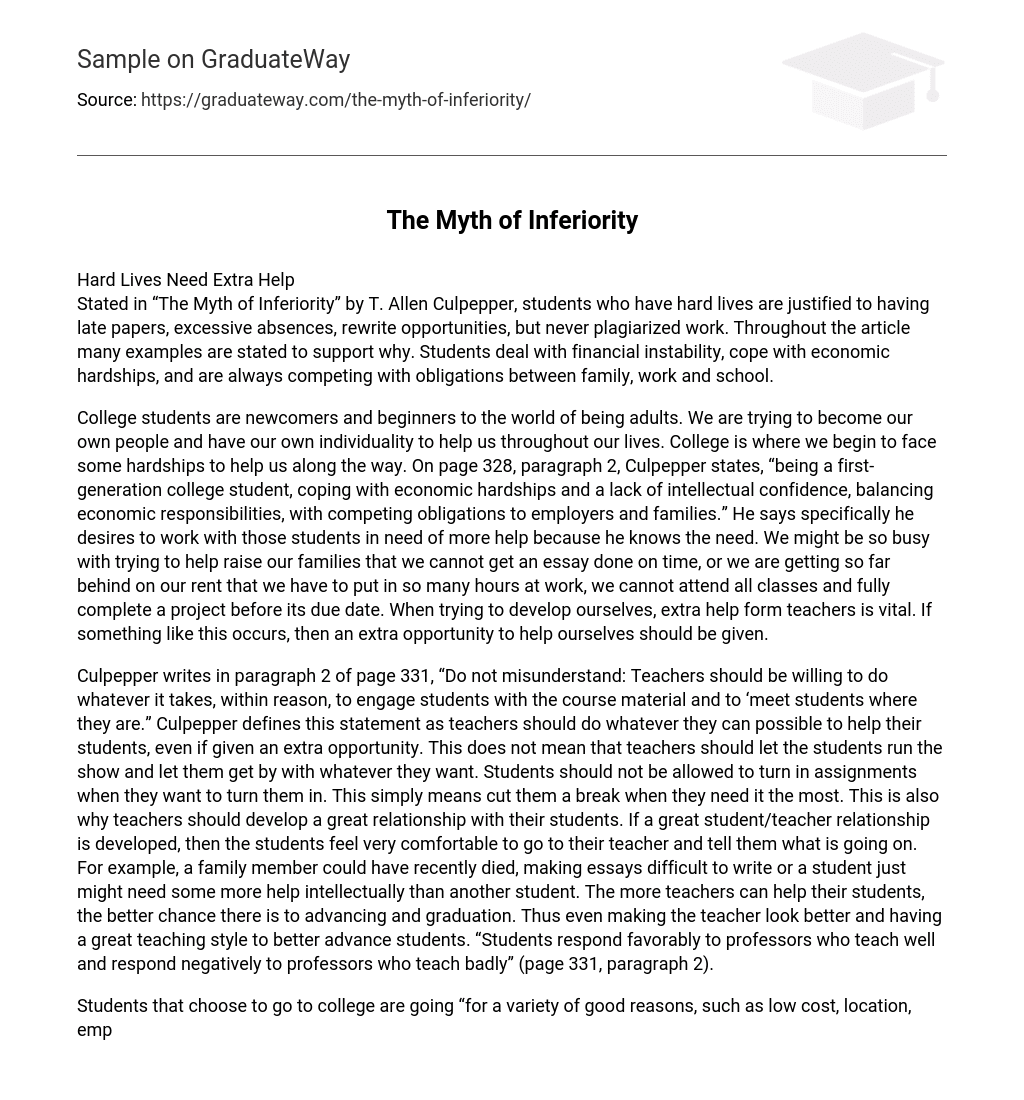Stated in “The Myth of Inferiority” by T. Allen Culpepper, students who have hard lives are justified to having late papers, excessive absences, rewrite opportunities, but never plagiarized work. Throughout the article many examples are stated to support why. Students deal with financial instability, cope with economic hardships, and are always competing with obligations between family, work and school.
College students are newcomers and beginners to the world of being adults. We are trying to become our own people and have our own individuality to help us throughout our lives. College is where we begin to face some hardships to help us along the way. On page 328, paragraph 2, Culpepper states, “being a first-generation college student, coping with economic hardships and a lack of intellectual confidence, balancing economic responsibilities, with competing obligations to employers and families.” He says specifically he desires to work with those students in need of more help because he knows the need.
We might be so busy with trying to help raise our families that we cannot get an essay done on time, or we are getting so far behind on our rent that we have to put in so many hours at work, we cannot attend all classes and fully complete a project before its due date. When trying to develop ourselves, extra help form teachers is vital. If something like this occurs, then an extra opportunity to help ourselves should be given.
Culpepper writes in paragraph 2 of page 331, “Do not misunderstand: Teachers should be willing to do whatever it takes, within reason, to engage students with the course material and to ‘meet students where they are.” Culpepper defines this statement as teachers should do whatever they can possible to help their students, even if given an extra opportunity. This does not mean that teachers should let the students run the show and let them get by with whatever they want.
Students should not be allowed to turn in assignments when they want to turn them in. This simply means cut them a break when they need it the most. This is also why teachers should develop a great relationship with their students. If a great student/teacher relationship is developed, then the students feel very comfortable to go to their teacher and tell them what is going on. For example, a family member could have recently died, making essays difficult to write or a student just might need some more help intellectually than another student.
The more teachers can help their students, the better chance there is to advancing and graduation. Thus even making the teacher look better and having a great teaching style to better advance students. “Students respond favorably to professors who teach well and respond negatively to professors who teach badly” (page 331, paragraph 2).
Students that choose to go to college are going “for a variety of good reasons, such as low cost, location, emphasis on teaching, and flexible class schedules” (page 330). Most students that attend four year universities are straight out of high school and living off of their mommy and daddy’s money and seem to have no bigger responsibility than barely getting stuff done to get by and to graduate. We, as older students, choose to go to a community college because we know that the teachers are more willing to help and we know that we have a better chance of graduating because of the above listed reasons. The amount of help we can get from our teachers is very crucial in passing classes and graduating.
After reading this article, I have seen the points that Culpepper makes in comparing different college students and the universities they attend. None of them, though, are reasons why teachers should be too hard on students to not give them all the opportunity possible to complete assignments properly. If they only have that availability to turn in something late then they should have that opportunity. When students miss excessive classes they should have the opportunity to make things up, within reason. And if students are really trying their best and need a rewrite opportunity, then that should be given as well. As a teacher, “the means” (page 331, paragraph 3), would be your own failure not to help out students who commit academic sins when they need help.
Works Cited
- Culpepper, T. Allen. “The Myth of Inferiority.” The Reader. Ed. Judy Sieg. 3rd Edition. Boston: Pearson Custom Publishing, 2010. 298. Print.





